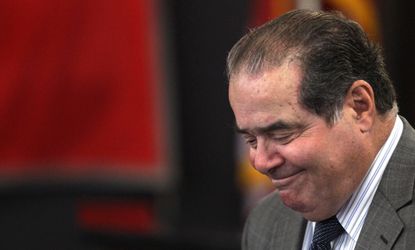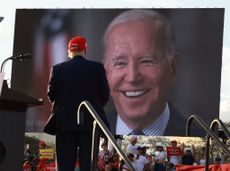Why Antonin Scalia was right to defend a drug dealer
The conservative justice's exquisite defense of the Fourth Amendment is a credit to the American justice system


Prado Navarette in August 2008 was driving 30 pounds of marijuana through California when he was stopped by the cops on suspicion of drunk driving. His case went all the way to the Supreme Court. And today, in a blistering dissent joined by three of the court's liberal justices — Sonia Sotomayor, Ruth Bader Ginsburg, and Elena Kagan — Justice Antonin Scalia defended Navarette, arguing that the search of his car was a violation of the Fourth Amendment's protections against unreasonable searches and seizures.
But Scalia was unable to convince his conservative confreres, who joined a majority opinion by Justice Clarence Thomas that deemed the search legal. The issue before the court was this: Whether the Fourth Amendment requires an officer who receives an anonymous tip regarding a drunken or reckless driver to corroborate dangerous driving before stopping the vehicle.
Prado Navarette fell under suspicion after a 911 caller said Navarette had run her off the road. She described Navarette's truck and even told authorities the license plate number. Police took this as suspicion of driving under the influence of alcohol, and found the truck Navarette was driving. The cops followed him for five minutes before pulling him over, at which point they discovered he was not drunk. But his car was searched anyway, and the drugs were found.
Subscribe to The Week
Escape your echo chamber. Get the facts behind the news, plus analysis from multiple perspectives.

Sign up for The Week's Free Newsletters
From our morning news briefing to a weekly Good News Newsletter, get the best of The Week delivered directly to your inbox.
From our morning news briefing to a weekly Good News Newsletter, get the best of The Week delivered directly to your inbox.
Thomas says the cops were within their rights to rely solely on the anonymous witness' observations. Scalia's dissent rips the majority opinion limb from limb.
Scalia contends that police had no reason to credit the 911 caller's story in the first place, much less believe Navarette's erratic driving was the result of mental impairment. People may make a sudden or reckless-seeming maneuver in their vehicle for all sorts of non-criminal reasons. "I fail to see how reasonable suspicion of a discrete instance of irregular or hazardous driving generates a reasonable suspicion of ongoing intoxicated driving," Scalia writes (emphasis original). Amusingly, Scalia says that this one instance of dangerous driving could have been caused by Navarette's trying to avoid a pothole, or simply being distracted by an argument about sports with his brother.
Scalia contends that Fourth Amendment jurisprudence holds that officers must suspect an ongoing crime to stop someone. But in this case, "in order to stop the petitioners the officers here not only had to assume without basis the accuracy of the anonymous accusation but also had to posit an unlikely reason (drunkenness) for the accused behavior."
He admits that the anonymous call may have been a reason to observe the car for erratic behavior, but once the cops had observed Navarette's impeccable driving for five minutes, they no longer had any reason to believe Navarette was committing a crime. In fact, this observation should have discredited any suspicion. Further, he says the majority erred by asserting that Navarette could have somehow improved his drunk-driving once he became aware of the police. He writes:
I take it as a fundamental premise of our intoxicated-driving laws that a driver soused enough to swerve once can be expected to swerve again — and soon. If he does not, and if the only evidence of his first episode of irregular driving is a mere inference from an uncorroborated, vague, and nameless tip, then the Fourth Amendment requires that he be left alone. [SupremeCourt.gov]
Scalia concludes:
After today's [majority] opinion all of us on the road, and not just drug dealers, are at risk of having our freedom of movement curtailed on suspicion of drunkenness, based upon a phone tip, true or false, of a single instance of careless driving. [SupremeCourt.gov]
Both opinions are worth reading. I agree with Scalia that it is troubling that the court ruled today that a simple, uncorroborated phone tip can lead to a search of a person and their effects. At first blush that would seem to encourage malicious tipping. Scalia calls the majority's reasoning "a freedom-destroying cocktail."
Having said all that, while I think Scalia easily has the better of the argument in Navarette v. California, it is worth reflecting on what a credit this case is to our judicial system. In most countries on Earth, the top jurists in the nation would never question whether a single search initiated by local police was reasonable and legal, especially when it resulted in the apprehension of a man who was committing an arguably graver offense than the one of which he was suspected. Indeed, this is unusual by the standards of the rest of the world and history, and a great inheritance from the common-law tradition.
Now if only the court would adopt Scalia's high standard for other cases, including the search of persons on city streets and the collection of data by the national security apparatus.
Create an account with the same email registered to your subscription to unlock access.
Sign up for Today's Best Articles in your inbox
A free daily email with the biggest news stories of the day – and the best features from TheWeek.com
Michael Brendan Dougherty is senior correspondent at TheWeek.com. He is the founder and editor of The Slurve, a newsletter about baseball. His work has appeared in The New York Times Magazine, ESPN Magazine, Slate and The American Conservative.
-
 'Voters know Biden and Trump all too well'
'Voters know Biden and Trump all too well'Instant Opinion Opinion, comment and editorials of the day
By Harold Maass, The Week US Published
-
 Is the Gaza war tearing US university campuses apart?
Is the Gaza war tearing US university campuses apart?Today's Big Question Protests at Columbia University, other institutions, pit free speech against student safety
By Joel Mathis, The Week US Published
-
 DOJ settles with Nassar victims for $138M
DOJ settles with Nassar victims for $138MSpeed Read The settlement includes 139 sexual abuse victims of the former USA Gymnastics doctor
By Justin Klawans, The Week US Published
-
 Arizona court reinstates 1864 abortion ban
Arizona court reinstates 1864 abortion banSpeed Read The law makes all abortions illegal in the state except to save the mother's life
By Rafi Schwartz, The Week US Published
-
 Trump, billions richer, is selling Bibles
Trump, billions richer, is selling BiblesSpeed Read The former president is hawking a $60 "God Bless the USA Bible"
By Peter Weber, The Week US Published
-
 The debate about Biden's age and mental fitness
The debate about Biden's age and mental fitnessIn Depth Some critics argue Biden is too old to run again. Does the argument have merit?
By Grayson Quay Published
-
 How would a second Trump presidency affect Britain?
How would a second Trump presidency affect Britain?Today's Big Question Re-election of Republican frontrunner could threaten UK security, warns former head of secret service
By Harriet Marsden, The Week UK Published
-
 'Rwanda plan is less a deterrent and more a bluff'
'Rwanda plan is less a deterrent and more a bluff'Instant Opinion Opinion, comment and editorials of the day
By The Week UK Published
-
 Henry Kissinger dies aged 100: a complicated legacy?
Henry Kissinger dies aged 100: a complicated legacy?Talking Point Top US diplomat and Nobel Peace Prize winner remembered as both foreign policy genius and war criminal
By Harriet Marsden, The Week UK Last updated
-
 Trump’s rhetoric: a shift to 'straight-up Nazi talk'
Trump’s rhetoric: a shift to 'straight-up Nazi talk'Why everyone's talking about Would-be president's sinister language is backed by an incendiary policy agenda, say commentators
By The Week UK Published
-
 More covfefe: is the world ready for a second Donald Trump presidency?
More covfefe: is the world ready for a second Donald Trump presidency?Today's Big Question Republican's re-election would be a 'nightmare' scenario for Europe, Ukraine and the West
By Sorcha Bradley, The Week UK Published